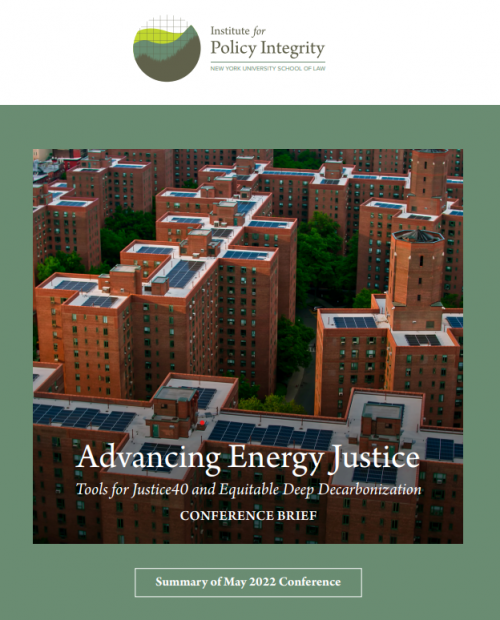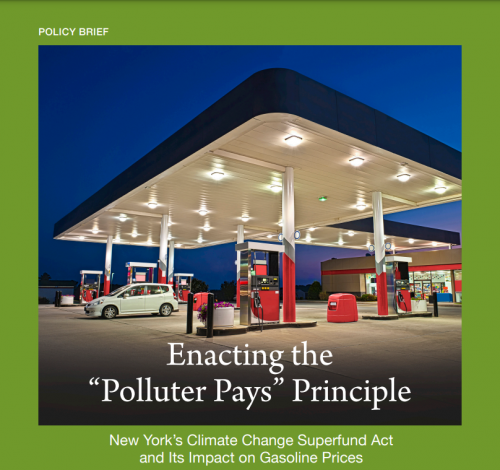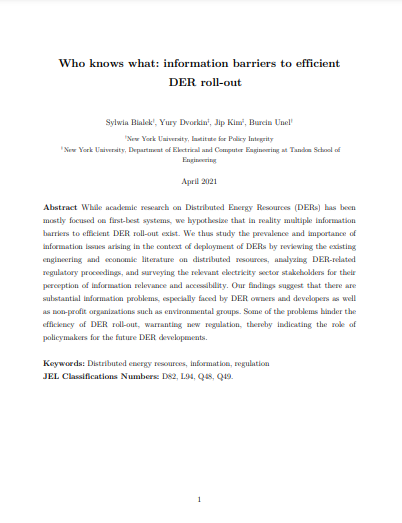-
Amicus Brief in D.C. Circuit Defending BOEM’s Authority to Robustly Consider Climate Impacts in Offshore Leasing
Earlier this year, a group of environmental organizations successfully challenged an offshore oil-and-gas lease sale held by the Bureau Ocean Energy Management on the basis that BOEM inadequately assessed the impacts on climate change from the combustion of the fossil fuels that the lease sale would facilitate. In its appeal to the D.C. Circuit, the American Petroleum Institute countered that any analytical limitations were harmless because the Outer Continental Shelf Lands Act bars BOEM from considering climate-change impacts when administering leasing policy. Our amicus brief rebuts this argument and defends BOEM’s authority to consider downstream climate impacts in its administration of the offshore leasing program. Our brief explains that the consideration of downstream emissions is consistent with OCSLA’s text, legislative history, regulatory history, and caselaw.
-

Advancing Energy Justice Conference Brief
Tools for Justice40 and Equitable Deep Decarbonization
This brief summarizes some of the major points of discussion from our May 2022 conference, “Advancing Energy Justice: Tools for Justice40 and Equitable Deep Decarbonization.” The event brought together federal agency staff working to implement Justice40 with researchers to discuss how academic research can be more responsive to communities’ needs. This brief summarizes the varied views expressed by conference participants and is not intended to be a consensus or recommendation document.
-
Comments to EPA on Greenhouse Gas Reduction Fund
The Environmental Protection Agency recently solicited public input on how to implement the Inflation Reduction Act’s Greenhouse Gas Reduction Fund, which provides $27 billion to support zero-emission technologies and other projects that reduce or avoid greenhouse gas emissions and other forms of air pollution, including in low-income and disadvantaged communities. We recommended that EPA require funding applicants to submit cost-benefit analyses for their proposed projects and, where otherwise consistent with statutory requirements, use the results of such analyses to prioritize funding allocations. We further recommended that such analyses account for significant unquantified effects, include assessments of distributional impacts, and consider the project’s potential to increase (or reduce) resilience to climate change. Finally, we suggested that, in tracking the success of the program, EPA identify climate resilience as a relevant program outcome.
-

Enacting the “Polluter Pays” Principle
New York’s Climate Change Superfund Act and Its Impact on Gasoline Prices
This policy brief analyzes how New York State’s recently proposed Climate Change Superfund Act is most likely to affect consumer gasoline prices. The Act would require payments from fossil-fuel companies based on their historical contributions to current greenhouse gas levels in the atmosphere. The payments would be used to build green infrastructure to help the state adapt to climate change. The brief finds that the Act would likely have a negligible impact on current and near-term oil prices, while potentially lowering future energy prices in New York, including for transportation.
-
Who Knows What: Information Barriers to Efficient DER Roll-Out
Published in International Association of Energy, Environment and Economy Journal
While academic research on Distributed Energy Resources (DERs) has been mostly focused on first-best systems, we hypothesize that in reality multiple information barriers to efficient DER roll-out exist. We thus study the prevalence and importance of information issues arising in the context of deployment of DERs by reviewing the existing engineering and economic literature on distributed resources, analyzing DER-related regulatory proceedings, and surveying the relevant electricity sector stakeholders for their perception of information relevance and accessibility.
-
Policy Integrity Research Shapes New Federal Climate Damage Estimates
In its updated climate damage estimates for greenhouse gas emisisons, the Environmental Protection Agency (EPA) cited Policy Integrity scholarship and analysis dozens of times and adopted some of our key arguments. EPA calculated damages based on averaging three damage functions, one of which was based on a paper by Peter Howard and Thomas Sterner. In setting the scope of damages to examine, the agency also adopted Policy Integrity's argument for the need to consider global damages. EPA similarly relied on our arguments about the need to use lower discount rates when assessing the value of future damages.
-
SC-GHG Comments on DOE Standards for Microwave Ovens
We submitted joint comments to the Department of Energy (DOE) on its proposed rule to strengthen energy conservation standards for microwave ovens. Our comments applaud the agency for appropriately applying the social cost of greenhouse gases to estimate the climate benefits of the proposed standards, even though the standards would be cost-benefit justified without considering any climate benefits. We also expand upon DOE's justifications for adopting a global damages valuation and for the range of discount rates it applies to climate effects.
-
Comments to DOE on Clean Hydrogen Production Standard
The Department of Energy (DOE) solicited comments on its draft guidance for the Clean Hydrogen Production Standard, a target that will be selected by DOE for the carbon intensity of clean hydrogen. This standard relates to DOE’s implementation of the hydrogen-hub provision of the Bipartisan Infrastructure Law. Policy Integrity and WattTime submitted comments to DOE on how to accurately measure the carbon emissions from using grid electricity to produce hydrogen. In particular, we suggested the use of a marginal-emissions approach instead of an annual-average approach. We also recommended that DOE adhere to rigorous carbon-accounting principles if hydrogen producers want to use market instruments like renewable energy credits or power-purchase agreements to characterize the carbon intensity of hydrogen produced using grid electricity.
-
Supplemental Comments Addressing Impact of West Virginia v. EPA on FERC’s Proposed Policy Statements for Natural Gas Infrastructure
In February, the Federal Energy Regulatory Commission proposed two policy statements that called for the consideration of climate impacts in pipeline certificate proceedings. In April, we filed two comments letters on these proposed policy statements, including one letter filed jointly with over two dozen legal scholars rebutting arguments that the Commission lacks authority to consider climate effects in its oversight of natural gas infrastructure under the Natural Gas Act and, relatedly, that the proposed policy statements implicate the major questions doctrine. Today, we submitted supplemental comments rebutting arguments that the Supreme Court’s recent decision on the major questions doctrine in West Virginia v. EPA somehow affects the Commission’s ability to finalize its proposed policy statements.
-
Comments to Bureau of Ocean Energy Management on Proposed Five-Year Offshore Leasing Plan
In July, the Bureau of Ocean Energy Management (BOEM) released its proposed five-year offshore leasing plan, which contemplates scheduling anywhere from zero to eleven lease sales over the coming half-decade. As part of that proposal, BOEM conducts a cost-benefit analysis in which it finds net benefits from offshore leasing, but recognizes uncertainty and specifically calls for comment on this analysis.
In response to this call for comments, Policy Integrity submitted two original reports offering extensive feedback on BOEM’s cost-benefit analysis. As detailed in those reports, BOEM’s analysis severely understates the costs of OCS leasing—particularly the climate costs. Our reports offer original analysis and modeling finding that, properly considered, the climate costs of offshore leasing alone may exceed the total benefits from that leasing.
Viewing recent projects in Climate and Energy Policy









